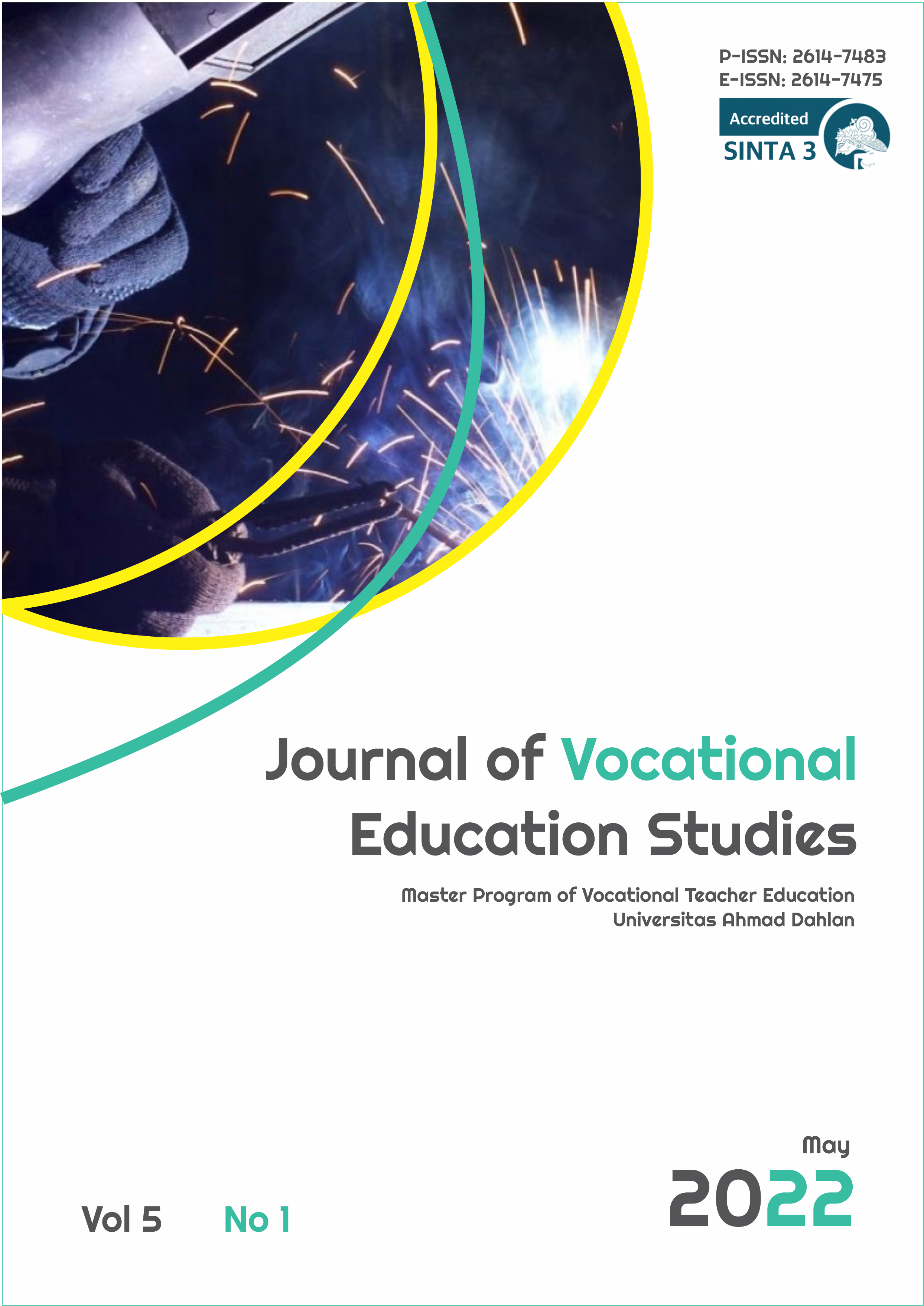Awareness of Vocational and Technical Education Lecturers in Utilising the Emerging Technology Posed by Covid-19 Pandemic
DOI:
https://doi.org/10.12928/joves.v5i1.5867Keywords:
Key words: Awareness, Vocational and Technical Education, Emerging Technology, Covid-19 PandemicAbstract
The study was carried out to examine the awareness of vocational and technical eduation lecturers in utilizing the emerging technology posed by Covid-19 pandemic in Oyo State Colleges of Education. To achieve the objectives of the study, three research questions were developed and answered while two null hypotheses were tested at 0.05 level of significance. The study adopted survey research design. The population for the study consisted of 150 lecturers. Total enumeration sampling technique was used for this research work. The questionnaire was faced and content validated by two experts from the Department of Business Education and one expert from Industrial Technical Education Department, Tai Solarin University of Education, Ijebu-ode. Cronbach Alpha method was adopted to ensure reliability of the instrument with the coefficient of r=0.96. This shows that the instrument is highly reliable. The questionnaire was administered on 150 respondents and all were successfully retrieved. Mean and Standard deviation were used to answer data related to research questions while t-test and ANOVA analysis were used to test the null hypotheses at 0.05 level of significance. The findings of the study revealed that awareness level of the Vocational and Technical Education lecturers on the use of available technological tools for teaching and learning is moderately high. The extent of usage of modern technological tools for teaching and learning is low compare to their awareness. Challenges faced by Vocational and Technical Education lecturers in using modern technological tools is moderately high. The study revealed that there is significant relationship between male and female Vocational and Technical Education lecturers on the extent of lecturers` awareness on the use of modern technological tools. The study as well revealed that there is significant relationship between the respondents on the challenges faced by Vocational and Technical Education lecturers in using modern technological tools for teaching and learning with respect to their years of experience. Based on the findings, it was recommended among others that government through a relevant agencies like Tertiary Education Trust Fund (TETFund) should assist in providing some adequate modern technological tools for Colleges of Education, school management should provide modern technological tools for the smooth running of teaching and learning, Seminars and Conferences on the use of modern technological tools be attended at an interval.
References
Abati, R. (April 7, 2020). Corona blues. Available online at http://shaharareporters.com/2020/04/07/coronablues-blues-reuben-abati.
Agbetuyi, P. A. & Oluwatayo, J. A. (2012). Information and communication technology (ICT) in Nigerian Educational System. Mediterranean Journal of Social Sciences, 3(3), 40–45.
Biello, D. (2009). Can videoconferencing replace travel. Scientific American, 1(2), 16–28.
Chika, C. (2012). Information and communication technology: a modern tool for education management in Nigerian Universities. Journal of African Studies in Educational Management and Leadership, 2(1), 7–15.
CoSN. (2020). COVID-19 Response: Preparing to take school online. Retrieved from https://www.cosn.org/sites/default/files/COVID-19%20Member%20Exclusive_0.pdf.
Eze, S.C., Chinedu-Eze, V.C. & Bello, A.O. (2018). The utilisation of e-learning facilities in the educational delivery system of Nigeria: a study of M-University. International Journal of Educational Technology in Higher Education,15(34); 1-20. https://doi.org/10.1186/s41239-018-0116-z.
Hennessy, S., Deaney, R., & Ruthven, K. (2006). Situated expertise in integrating use of multimedia simulation into secondary science teaching. International Journal of Science Education, 28(7), 701-732. https://doi.org/10.1080/09500690500404656.
Kaplan, A. & Haenlein, M. (2010). Users of the World, Unite! The challenges and opportunities of social media. Business Horizon, 53(1), 59–68.
Oye, N. D., Shallsuku, Z. K. & Iahad, A. N. (2012). The role of ICT in education: focus on university undergraduates taking mathematics as a course. International Journal of Advanced Computer Science and Applications (IJACSA), 3(2), 136–143. Retrieved from www.ijacsa.thesai.org
Selwyn, N. (2012). Education in a Digital World: Global Perspectives on Technology and Education. New York, London: Routledge.
Shulman, L. S. (1987). “Knowledge and Teaching. Foundations of the New Reform.” Harvard Educational Review 57: 1–22. doi:10.17763/haer.57.1.j463w79r56455411.
Tsokura, A. & Agwu, E. A. (2013). Assessment of online resources usage by Agricultural Science Lecturers of Tertiary Institutions in Benue State, Nigeria. American Journal of Research Communication, 1(10), 254–279.
UNESCO (2007). The UNESCO ICT in education program. United Nations educational, scientific and cultural organization (UNESCO): Bangkok, Thailand. Available from www.unescobkk.org/education/ict.
UNESCO (2020). COVID-19 Educational Disruption and Response. Retrieved from:https://en.unesco.org/covid19/educationresponse. UNESCO.
UNESCO. (2020). Edutech solution for Covid-19 response. Retrieved from http://www.gynzy.com/en/digital-distance-learning-tips-tricks/, UNESCO.
World Bank. (2020b). Remote Learning and COVID-19 The use of educational technologies at scale across an education system as a result of massive school closings in response to the COVID-19 pandemic to enable distance education and online learning. Retrieved from file:///E:/PC/Rapid-Response-Briefing-Note-Remote-Learning-and-COVID-19-Outbreak.pdf
Worldo Meters (2020). Worldo meters Covid, Coronavirus Update (Live), www.worldometers.info
Downloads
Published
Issue
Section
License
Copyright (c) 2022 Universitas Ahmad Dahlan

This work is licensed under a Creative Commons Attribution-ShareAlike 4.0 International License.
Authors who publish with Journal of Vocational Education Studies (JOVES) agree to the following terms: Authors retain the copyright and grant the Universitas Ahmad Dahlan right of first publication with the work simultaneously licensed under a Creative Commons Attribution License (CC BY-SA 4.0) that allows others to share (copy and redistribute the material in any medium or format) and adapt (remix, transform, and build upon the material) the work for any purpose, even commercially with an acknowledgement of the work's authorship and initial publication in Universitas Ahmad Dahlan. Authors are able to enter into separate, additional contractual arrangements for the non-exclusive distribution of the journal's published version of the work (e.g., post it to an institutional repository or publish it in a book), with an acknowledgement of its initial publication in Universitas Ahmad Dahlan. Authors are permitted and encouraged to post their work online (e.g., in institutional repositories or on their website) prior to and during the submission process, as it can lead to productive exchanges, as well as earlier and greater citation of published work (See The Effect of Open Access).










.png)



